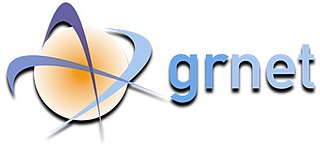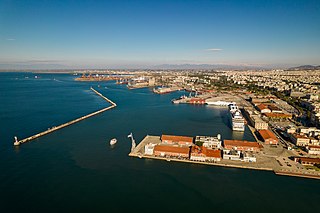The telecommunications and postal services market in Greece is regulated by the Hellenic Telecommunications and Post Commission (EETT).

The London Internet Exchange (LINX) is a mutually governed Internet exchange point (IXP) providing peering services and public policy representation to network operators, encompassing over 950 different autonomous systems (ASNs). Established in 1994 in London, LINX operates IXPs in London, Manchester, Scotland, and Wales in the United Kingdom, as well as in Northern Virginia, United States.
Television broadcasting in Greece began in 1966, preceded in 1951 by statute 1963 permitting television broadcasting.
Internet exchange points are common grounds of IP networking, allowing participant Internet service providers (ISPs) to exchange data destined for their respective networks. IXPs are generally located at places with preexisting connections to multiple distinct networks, i.e., datacenters, and operate physical infrastructure (switches) to connect their participants. Organizationally, most IXPs are each independent not-for-profit associations of their constituent participating networks. The primary alternative to IXPs is private peering, where ISPs directly connect their networks to each other.

Hellenic Telecommunications Organisation S.A. is the largest technology company in Greece. It is one of the three largest companies listed in the Athens Stock Exchange, according to market capitalization.

The Aristotle University of Thessaloniki is the second oldest tertiary education institution within Greece. Named after the philosopher Aristotle, who was born in Stageira, about 55 km east of Thessaloniki, it is the largest university in Greece and its campus covers 230,000 square metres in the centre of Thessaloniki, with additional educational and administrative facilities elsewhere.

The Greek Research and Technology Network or GRNET is the national research and education network of Greece. GRNET S.A. provides internet connectivity, e-infrastructure, and other services to the Greek Educational, Academic, and Research community. Additionally, GRNET makes digital applications. It also provides services to the following sectors: Education, Research, Health, Culture. GRNET supports all Universities, Technological Education Institutes, Research Centers, and over 9,500 schools.
Vodafone Greece is the Greek subsidiary of Vodafone Group Plc. In 2004 it was the leading mobile operator in Greece. Its headquarters are in Chalandri - one of the northern suburbs of Athens.

DE-CIX is an operator of carrier- and data-center-neutral Internet Exchanges, with operations in Europe, North America, Africa, the Middle East, India and Southeast Asia. All DE-CIX activities and companies are brought together under the umbrella of the DE-CIX Group AG.
Internet in Greece reached an 82% usage rate among individuals in 2022, yet it slightly trails behind the European Union averages in digital skills among individuals aged 16-74, as highlighted in the European Commission's Digital Decade Country Report 2023. In an effort to bridge this gap and enhance digital proficiency across the nation, Greece implemented the "Works Again" law in April 2022. This law is designed to modernize the Public Employment Service, aligning it more closely with the demands of the labor market and vocational training needs. Additionally, Greece has launched a strategic initiative for Vocational Education and Training (VET) and lifelong learning. This initiative aims to revamp educational curricula to include digital and green skills.
The Athens Internet Exchange was until January 2010 the main Internet Exchange Point in Greece, offering peering connectivity between the largest commercial ISPs as well as the academic network organization, GRNET. Operational authorities were GRNET along with the Network Operations Centre of the National Technical University of Athens. It operated under the auspices of the Hellenic National Telecommunications and Posts Committee the Greek regulator.

Hellas Online was one of the leading Greek fixed-line telephony service providers based in Athens. Founded in 1993, Hellas Online (hol) was one of the first Internet service providers in Greece offering public dial-up Internet access. It evolved from an ISP to a fixed-line telecommunications services provider offering a broad range of retail, business and wholesale services. Since 2006 it became a member of the Intracom Holdings group. Before its dissolution, following its merger, with Vodafone in 2014, it had 531,563 LLU subscribers.

The Port of Thessaloniki is the main maritime gateway to Southeast, Central and Eastern Europe, strategically located in Northern Greece close to the major Trans-European motorway and railway networks with direct access to the Southeastern European countries. ThPA S.A., listed on the Athens Stock Exchange since 2001, handles containers, conventional cargo, operates the free zone of the Port in accordance with tax and customs legislation currently in force authorized with AEO License, offers reliable and efficient logistics solutions and intermodal rail services and serves passenger traffic through cruise and ferry.
Interxion is a provider of carrier and cloud-neutral colocation data centre services in Europe. Founded in 1998 in the Netherlands, the firm was publicly listed on the New York Stock Exchange from 28 January 2011 until its acquisition by Digital Realty in March 2020. Interxion is headquartered in Schiphol-Rijk in the Netherlands, and operates 53 data centres in 11 European countries located in major metropolitan areas, including Dublin, London, Frankfurt, Paris, Amsterdam, and Madrid, the six main data centre markets in Europe, as well as Marseille, Interxion’s Internet Gateway.

The Alexander Technological Educational Institute of Thessaloniki, was a higher education public institute, part of the Greek tertiary education system, specialized on science. As of 2017, there was a student population of 30,000 registered students with more than 430 faculty members and 200 administrative staff. In 2019, the Alexander Technological Educational Institute of Thessaloniki merged with the Technological Educational Institute of Central Macedonia, the Technological Educational Institute of Eastern Macedonia and Thrace, and the International Hellenic University in order to form a new university, with the name of the latter.
The Technological Educational Institute (TEI) of Athens was a state higher-educational institute in Athens, only for applied sciences.
The National Research and Academic Network (NREN) of Greece the period 1984 -1995, also known as Ariadne, Ariadne network, Ariadne-t, initiated in 1984 as Programme Ariadne by Nicolas Malagardis under the Ministry of Research and Technology, in line with R&D policy of the EU Commission (DGXIII) and became founding member of COSINE and RARE, with contributions to its technical reports.
Open Technologies Alliance (GFOSS) is a Greek non-profit organization founded on February 28, 2008 by Greek Universities and Research Institutes. GFOSS was created to "further the cause of Free, Open Source Software (FOSS) and Openness"7 37 universities and research centers are shareholders of GFOSS.
The Internet Exchange Point Of Nigeria (IXPN) is a neutral and not-for-profit Internet exchange point (IXP) founded in 2006 by the Nigerian Communications Commission (NCC) in partnership with the Internet Service Providers Association Of Nigeria (ISPAN). Among other things, IXPN was created to reduce connectivity costs in millions of dollars in offshore internet bandwidth payments, reduce latency from 900 milliseconds to 30 milliseconds for local content, serve as the central point for connecting Higher Educational Institutions (HEIs) towards the development of National Research and Educational Network (NREN). As at April 2022, IXPN is the 5th largest IXP in Africa by number of peers, and 3rd in Africa by traffic according to Packet Clearing House’s IXP directory








